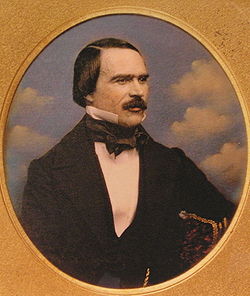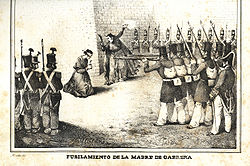
Ramón Cabrera
Encyclopedia

General
A general officer is an officer of high military rank, usually in the army, and in some nations, the air force. The term is widely used by many nations of the world, and when a country uses a different term, there is an equivalent title given....
of Spain
Spain
Spain , officially the Kingdom of Spain languages]] under the European Charter for Regional or Minority Languages. In each of these, Spain's official name is as follows:;;;;;;), is a country and member state of the European Union located in southwestern Europe on the Iberian Peninsula...
.
He was born at Tortosa
Tortosa
-External links:* *** * * *...
, province of Tarragona, Spain. As his family had in their gift two chaplaincies, young Cabrera was sent to the seminary of Tortosa, where he made himself conspicuous as an unruly pupil, ever mixed up in disturbances and careless in his studies. After he had taken minor orders, the bishop refused to ordain him as a priest, telling him that the Church was not his vocation, and that everything in him showed that he ought to be a soldier. Cabrera followed this advice and took part in Carlist conspiracies on the death of Ferdinand VII. The authorities exiled him and he absconded to Morella to join the forces of the pretender Don Carlos
Infante Carlos, Count of Molina
The Infante Carlos of Spain was the second surviving son of King Charles IV of Spain and of his wife, Maria Luisa of Parma. As Carlos V he was the first of the Carlist claimants to the throne of Spain...
.
In this First Carlist War
First Carlist War
The First Carlist War was a civil war in Spain from 1833-1839.-Historical background:At the beginning of the 18th century, Philip V, the first Bourbon king of Spain, promulgated the Salic Law, which declared illegal the inheritance of the Spanish crown by women...
(1833-1839) he rose in a very short time by sheer daring, fanaticism and ferocity to the front rank among the Carlist chiefs who led the bands of Don Carlos in Catalonia
Catalonia
Catalonia is an autonomous community in northeastern Spain, with the official status of a "nationality" of Spain. Catalonia comprises four provinces: Barcelona, Girona, Lleida, and Tarragona. Its capital and largest city is Barcelona. Catalonia covers an area of 32,114 km² and has an...
, Aragon
Aragon
Aragon is a modern autonomous community in Spain, coextensive with the medieval Kingdom of Aragon. Located in northeastern Spain, the Aragonese autonomous community comprises three provinces : Huesca, Zaragoza, and Teruel. Its capital is Zaragoza...
and Valencia. As a raider he was often successful, and he was many times wounded in the brilliant fights in which he again and again defeated the generals of Queen Isabella
Isabella II of Spain
Isabella II was the only female monarch of Spain in modern times. She came to the throne as an infant, but her succession was disputed by the Carlists, who refused to recognise a female sovereign, leading to the Carlist Wars. After a troubled reign, she was deposed in the Glorious Revolution of...
, such as at the Battle of Maella
Battle of Maella
The Battle of Maella was a battle of the First Carlist War, occurring on October 1, 1838, near the Aragonese town of Maella. The battle was a Carlist victory and resulted in the routing of most of the Liberal forces....
.

When Marshal Espartero
Baldomero Espartero, Prince of Vergara
Don Joaquín Baldomero Fernández-Espartero y Alvarez de Toro, 1st Prince of Vergara, 1st Duke of la Victoria, 1st Duke of Morella, 1st Count of Luchana, 1st Viscount of Banderas was a Spanish general and political figure...
induced the Carlists of the north-western provinces, with Maroto
Maroto
Maroto is a surname which may refer to:*Esteban Maroto, Spanish comic book artist*Mariano González Maroto, Spanish footballer*Rafael Maroto, 19th century Spanish general*Fray Diego Maroto, 17th century architect...
at their head, to submit in accordance with the Convention of Vergara
Convention of Vergara
The Convention of Vergara was a treaty successfully ending the major fighting in Spain's First Carlist War. The treaty—also known by many other names including the Embrace of Vergara was signed by Baldomero Espartero for the Isabelines and Rafael Maroto for the Carlists.The two generals met at...
, which secured the recognition of the rank and titles of 1000 Carlist officers, Cabrera held out in Central Spain for nearly a year. Marshals Espartero and O'Donnell, with the bulk of the Isabellino armies, had to conduct a long and bloody campaign against Cabrera before they succeeded in driving him into French territory in July 1840. The government of Louis Philippe
Louis-Philippe of France
Louis Philippe I was King of the French from 1830 to 1848 in what was known as the July Monarchy. His father was a duke who supported the French Revolution but was nevertheless guillotined. Louis Philippe fled France as a young man and spent 21 years in exile, including considerable time in the...
kept him in a fortress for some months and then allowed him to go to England, where he quarrelled with the pretender, disapproving of his abdication in favor of the count of Montemolin.
In 1848 Cabrera reappeared in the mountains of Catalonia at the head of Carlist bands. These were soon dispersed and he again fled to France. After this last effort he did not take a very active part in the propaganda and subsequent risings of the Carlists, who, however, continued to consult him. He took offence when new men, not a few of them quondam regular officers, became the advisers and lieutenants of Don Carlos in the Third Carlist War
Third Carlist War
The Third Carlist War was the last Carlist War in Spain. It is very often referred to as the Second Carlist War, as the 'second' had been small in scale and almost trivial in political consequence....
which lasted more or less from 1870-1876. Indeed, his long residence in England, his marriage with Miss Richards, and his prolonged absence from Spain had much shaken his devotion to his old cause and belief in its success.
In March 1875 Cabrera sprang upon Don Carlos a manifesto in which he called upon the adherents of the pretender to follow his own example and submit to the restored monarchy of Alphonso XII, the son of Queen Isabella, who recognized the rank of captain-general and the title of count of Morella conferred on Cabrera by the first pretender. Only a very few insignificant Carlists followed Cabrera's example, and Don Carlos issued a proclamation declaring him a traitor and depriving him of all his honours and titles.
Cabrera, who was ever afterwards regarded with contempt and execration by the Carlists, died in London on the 24 May 1877. He did not receive much attention from the majority of his fellow-countrymen, who commonly said that his disloyalty to his old cause had proved more harmful to him than beneficial to the new state of things. A pension which had been granted to his widow was renounced by her in 1899 in aid of the Spanish treasury after the loss of the colonies
Spanish-American War
The Spanish–American War was a conflict in 1898 between Spain and the United States, effectively the result of American intervention in the ongoing Cuban War of Independence...
.

